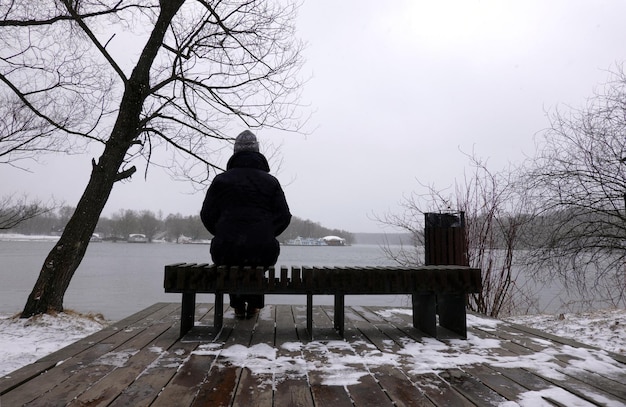Combat Post-Holiday Blues: Mental Wellness for Men in 2025

Combat Post-Holiday Blues: 5 Mental Wellness Strategies for Men in January 2025 offers practical tips for men to navigate the emotional dip after the holiday season, focusing on mental health through mindfulness, physical activity, social connection, goal setting, and professional guidance.
The holiday season, with its twinkling lights and festive cheer, often gives way to a January slump, especially for men. Combat Post-Holiday Blues: 5 Mental Wellness Strategies for Men in January 2025 is your essential guide to navigate this shift and prioritize your mental well-being.
Recognizing the Post-Holiday Blues in Men
The post-holiday blues are a real phenomenon, and understanding its unique impact on men is the first step towards effective management. It’s not just about missing the parties; it’s a combination of factors that can affect mood and motivation.
Understanding the Emotional Shift
Many men experience a letdown after the holidays due to the contrast between the excitement of the season and the return to routine. The anticipation, social gatherings, and gift-giving contribute to a heightened emotional state that inevitably declines.
Identifying the Signs of Post-Holiday Blues
Symptoms can vary, but common signs include increased irritability, fatigue, sleep disturbances, loss of interest in activities, and feelings of sadness or emptiness. Recognizing these early signs is crucial for addressing the issue proactively.
- Increased Irritability: Men may become more easily frustrated or short-tempered with family, friends, or colleagues.
- Fatigue and Low Energy: A persistent feeling of tiredness, even after adequate sleep, can be a significant symptom.
- Loss of Interest: Activities that were once enjoyable no longer hold appeal, leading to a sense of apathy.
Distinguishing between the post-holiday blues and more persistent mental health concerns is essential. If symptoms persist for more than a few weeks or significantly impact daily functioning, seeking professional help is advisable.
Strategy 1: Practicing Mindfulness and Meditation
Mindfulness and meditation are powerful tools for managing stress and improving mental clarity, especially during times of emotional adjustment. These practices help men become more aware of their thoughts and feelings without judgment.
Incorporating Mindfulness into Daily Life
Mindfulness involves paying attention to the present moment without getting caught up in thoughts about the past or future. This can be achieved through simple activities like focusing on your breath, savoring a meal, or taking a mindful walk.
Meditation Techniques for Men
Various meditation techniques can be beneficial, including guided meditation, which involves listening to a narrator who leads you through visualizations and relaxation exercises, and focused attention meditation, where you concentrate on a specific object or sensation.
- Guided Meditation: Use apps or online resources to follow guided meditation sessions.
- Focused Attention Meditation: Concentrate on your breath or a specific object to anchor your attention.
- Body Scan Meditation: Systematically bring awareness to different parts of your body, noticing sensations without judgment.

Establishing a consistent mindfulness and meditation practice can help men manage the emotional fluctuations associated with the post-holiday blues. Regular practice can reduce stress, improve focus, and enhance overall mental well-being.
Strategy 2: Engaging in Regular Physical Activity
Physical activity is a cornerstone of mental wellness, known to boost mood, reduce stress, and improve overall health. For men experiencing post-holiday blues, regular exercise can be a particularly effective strategy.
The Mental Health Benefits of Exercise
Exercise releases endorphins, which have mood-boosting effects. It also reduces stress hormones like cortisol and improves sleep quality, all of which contribute to better mental health.
Finding Activities You Enjoy
The key to sticking with an exercise routine is to find activities you find enjoyable. Whether it’s running, swimming, weightlifting, or playing a sport, choose something that motivates you and fits your lifestyle.
- Team Sports: Joining a sports team can provide both exercise and social interaction.
- Outdoor Activities: Hiking, biking, or simply walking in nature can be incredibly beneficial.
- Gym Workouts: A structured workout routine at the gym can offer a sense of accomplishment and progress.
Consistency is crucial for reaping the mental health benefits of exercise. Aim for at least 30 minutes of moderate-intensity exercise most days of the week to effectively combat the post-holiday blues.
Strategy 3: Prioritizing Social Connection
Social connection is vital for mental well-being, providing support, reducing feelings of isolation, and enhancing overall happiness. For men, maintaining and strengthening social bonds can be particularly important during the post-holiday period.
The Importance of Social Support for Men
Men often face societal pressures to be independent and self-reliant, which can make it difficult to seek social support. However, strong social connections are essential for managing stress and maintaining mental health.
Reaching Out to Friends and Family
Make an effort to connect with friends and family, whether it’s through phone calls, video chats, or in-person visits. Sharing your thoughts and feelings with loved ones can provide comfort and perspective.

- Plan Social Activities: Organize outings with friends or family to maintain regular social interaction.
- Join a Club or Group: Participating in activities with like-minded individuals can create new social connections.
- Volunteer: Helping others can provide a sense of purpose and connection to the community.
Actively engaging in social activities and nurturing relationships can significantly alleviate the post-holiday blues. Social connection provides a sense of belonging and reduces feelings of loneliness.
Strategy 4: Setting Realistic Goals for the New Year
Setting realistic goals for the new year can provide a sense of purpose and direction, helping men overcome the post-holiday slump. These goals should be achievable and aligned with personal values and interests.
The Power of Goal Setting
Goal setting provides a sense of control and accomplishment, which can boost motivation and self-esteem. It also helps men focus their energy on positive and productive activities.
Breaking Down Goals into Smaller Steps
Large goals can seem overwhelming, so it’s important to break them down into smaller, manageable steps. This makes the goals more achievable and provides a sense of progress along the way.
- Set SMART Goals: Ensure your goals are Specific, Measurable, Achievable, Relevant, and Time-bound.
- Track Your Progress: Monitor your progress and celebrate small victories to stay motivated.
- Be Flexible: Be willing to adjust your goals as needed to adapt to changing circumstances.
By setting and working towards realistic goals, men can shift their focus from the post-holiday blues to a more positive and forward-looking perspective. Goal setting provides a sense of purpose and direction in the new year.
Strategy 5: Seeking Professional Support When Needed
Sometimes, the post-holiday blues can be more persistent and severe, requiring professional support. Recognizing when to seek help from a mental health professional is crucial for addressing underlying issues and promoting long-term well-being.
Understanding the Benefits of Therapy
Therapy provides a safe and supportive environment for men to explore their thoughts and feelings, develop coping strategies, and address underlying mental health concerns. It can be particularly beneficial for those experiencing persistent symptoms of depression or anxiety.
Finding the Right Therapist
Finding a therapist who is a good fit is essential. Look for a mental health professional who specializes in men’s issues and has experience treating post-holiday blues or related conditions.
- Online Therapy: Provides convenient and accessible mental health support from the comfort of your own home.
- Support Groups: Connecting with others who are experiencing similar challenges can provide a sense of community and validation.
- Employee Assistance Programs (EAPs): Many employers offer confidential counseling services to employees.
Seeking professional support is a sign of strength, not weakness. It’s an important step in prioritizing your mental health and ensuring long-term well-being, especially when trying to combat post-holiday blues: 5 mental wellness strategies for men in January 2025.
| Key Strategy | Brief Description |
|---|---|
| 🧘Mindfulness | Practice daily to increase present moment awareness. |
| 💪 Exercise | Engage in regular physical activity to boost mood. |
| 🫂 Social Connection | Prioritize connecting with friends and family. |
| 🎯 Goal Setting | Set realistic goals to provide a sense of purpose. |
Frequently Asked Questions (FAQ)
▼
Common symptoms include sadness, fatigue, irritability, loss of interest in activities, and changes in sleep or appetite. These feelings often arise after the excitement of the holidays fades.
▼
Mindfulness helps you stay present and aware of your thoughts without judgment. Practicing mindfulness daily can reduce stress and increase emotional regulation, easing the transition back to routine.
▼
Physical activity releases endorphins, natural mood boosters that can alleviate symptoms of depression and anxiety. Regular exercise also improves sleep and reduces stress hormones, promoting overall well-being.
▼
Social connection provides support and reduces feelings of isolation. Interacting with friends and family can offer a sense of belonging and perspective, helping to lift your spirits after the holidays.
▼
If your symptoms persist for more than a few weeks or significantly impact your daily functioning, it’s time to seek professional help. A therapist can provide strategies and support to manage your mental health.
Conclusion
Combat Post-Holiday Blues: 5 Mental Wellness Strategies for Men in January 2025 offers a comprehensive approach to managing the emotional dip after the holidays. By incorporating mindfulness, physical activity, social connection, realistic goal setting, and professional support, men can navigate this challenging period and prioritize their mental well-being.





